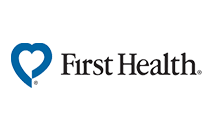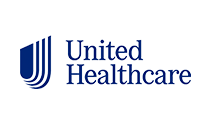Recognizing the herniated disc emergency symptoms is crucial for seeking timely medical intervention. If you or someone you know is experiencing severe pain, loss of bladder or bowel control, numbness, or weakness, it could indicate a serious condition requiring immediate attention.
At the Advanced Spine Center, we can help you achieve relief from your pain. To schedule an appointment, please call our office today at 972-499-5457.
Herniated Disc Symptoms
Although back pain is a common issue, it can grow into an emergency. Symptoms such as sudden numbness and difficulty urinating may indicate multiple syndromes. These conditions are caused by a large disc herniation that compresses the nerve roots at the end of the outer layer of the spinal cord. These discs are also called vertebrae and help your spine function with a spinal disk.
The nerve root is responsible for transmitting signals to the bladder or bowel control, legs, and other parts of the body. If the nerves remain compressed for too long, it can lead to irreversible damage. It is crucial to relieve pressure immediately to prevent permanent harm.
Recognizing Herniated Disc Emergency Symptoms
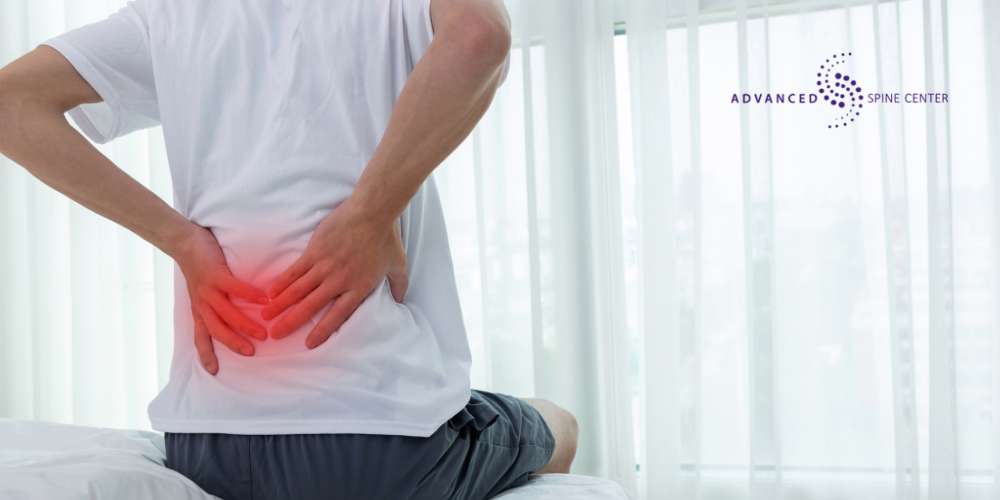
When you suspect you have a herniated disc, it’s important to recognize the symptoms of a potential emergency. Herniated discs are often found in the lumbar spine. If your ruptured disc is in this area, you might experience sharp and burning lower back pain. The shooting pain may also extend to the buttocks or down one leg. You might also feel weakness, tingling, or numbness in one leg.
Disk herniation can also affect the cervical spine or neck. In this case, you may experience headaches, particularly at the back of the skull, as well as pain in the neck, shoulder, and arm, which can sometimes lead to weakness or tingling in one arm. These symptoms may worsen from sneezing or coughing, as these actions put additional pressure on the nerves.
Cervical Herniated Disc Emergency Symptoms
Some symptoms of a cervical herniated disk that can be considered emergencies include severe leg weakness and loss of bladder and bowel function. Severe leg weakness can indicate that the herniated disc is compressing the spinal cord or nerve roots to a significant extent, potentially leading to permanent damage if not treated promptly. Loss of bladder and bowel function is a particularly serious symptom, suggesting that the nerves controlling these functions are being severely compressed.
Lumbar Herniated Disc Emergency Symptoms
You should seek emergency medical attention for herniated disks if you experience symptoms such as bladder and bowel dysfunction or other serious symptoms. These symptoms include pain, numbness, or weakness that increases to the point of interfering with daily activities. Bladder or other dysfunction, such as incontinence, loss of the urge to urinate, or inability to control bodily functions, is a rare but serious condition that can lead to severe damage that can be avoided if the herniated disks heal in the lumbar spine.
Other serious conditions include cauda equina syndrome, which can cause incontinence or difficulty urinating even when the bladder is full. It can also cause saddle anesthesia, which is a progressive loss of sensation in the inner thighs, backs of the legs, and around the rectum.
When Are Herniated Discs Considered Emergencies?
Globally, low back pain is a leading cause of disability. A study found that between 75% and 85% of Americans have experienced back pain during their lifetimes. Lower back pain can be caused by problems in the muscles, nerves, or spine. Most back pain is either short-term or long-term and can last several days to weeks. However, some individuals may develop chronic back problems that persist for at least three to six months. Back pain emergencies can also occur, requiring immediate treatment and sometimes even surgery.
Cauda Equina Syndrome
Cauda equina syndrome differs from other chronic or long-lasting back problems because it is an immediate event similar to a stroke or heart attack. It often occurs rapidly, lasting from 6 to 10 hours. Along with the classic signs of back pain, it presents with sudden numbness and urinary retention. Promptly relieving the compression can be the deciding factor between a normal life and paralysis for the patient.
Cauda Equina Syndrome Symptoms
Cauda equina compression can lead to problems with bladder, bowel, or sexual function. Common worsening symptoms include searing pain in the lower back and buttocks, muscle spasms, and numbness in the “saddle region,” which is the rectal, genital, and inner thighs. The pain can radiate from the back of the thigh down to the knee and foot. Paralysis or weakness of the foot or leg may occur, especially when trying to get out of a chair. Extreme leg weakness and loss of bladder and bowel function are signs of a medical emergency.
Extremely Severe Symptoms
The round discs in the spine act as shock absorbers, cushioning the bones. An injury, sudden strain, or excessive pressure can cause the inner portion of a disc to protrude through its outer ring. This is known as a herniated, ruptured, or slipped disc. Severe cases can lead to emergency situations and herniated disc surgery.
Symptoms may include lower back pain, sharp pain radiating down the legs or arms, loss of bladder control, numbness or weakness in the foot or leg, and tingling sensations.
Saddle Anesthesia
Saddle anesthesia is a condition where there is a loss of sensation in the buttocks, perineum, and inner thigh area. You can ease pain with treatments and diagnostic tests, as well as look into your medical history for any progressive nerve damage or other risk factors.
Symptoms That Worsen with Time
Without treatment, herniated disk symptoms can worsen over time and cause the compression and irritation of surrounding nerves causing painful tears.
Other Back Pain Emergencies
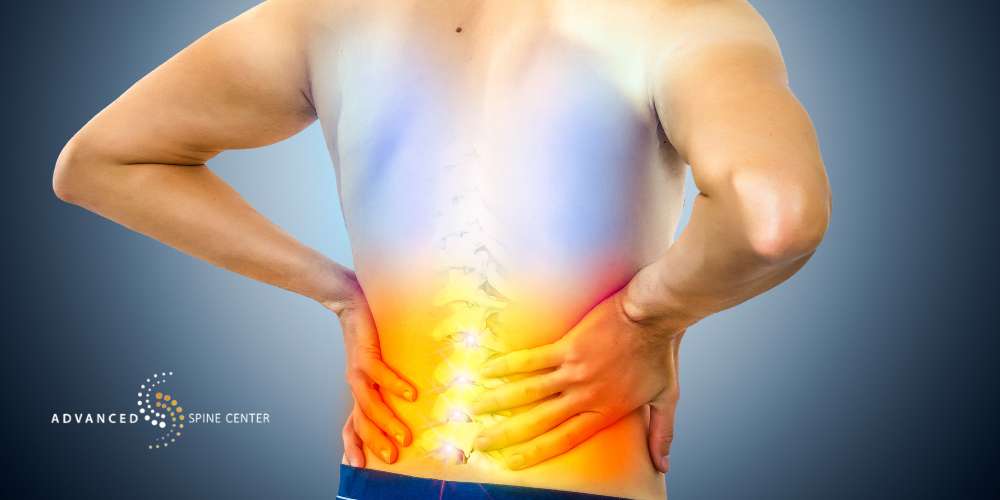
Other back pain emergencies include symptoms such as severe pain in the back, weakness in the limbs, trouble in the bladder or bowel system, sharp pains in the arms and legs, and numbness in various parts of the body.
Any of these medical emergencies should receive help as soon as possible from a well-established facility such as the Advanced Spine Center, where we have experienced doctors who have provided over 28 years of excellent care.
Spinal Fractures
High-energy trauma or accidents can cause spine fractures. The first sign is severe back pain, which can worsen with movement. If the fracture affects the spinal nerves, it can lead to tingling, weakness, and bladder dysfunction.
Metastatic Spinal Cord Compression
Metastatic spinal cord compression (MSCC) is a serious condition that often requires emergency treatment. It occurs when cancer cells spread to the spine and press on the spinal canal. The most common symptoms include severe back and neck pain, which can be aggravated by sneezing, coughing, using the toilet, or lifting heavy objects.
Other symptoms include leg pain and pain in the arms, difficulty with bowel control, abdominal, chest, or stomach pain, and tingling or numbness in various parts of the body. If left untreated, MSCC can lead to paralysis.
Vertebral Osteomyelitis
Vertebral bone marrow inflammation is the most common form of spinal infection. It can result from an injury to the spinal cord or from bacterial or fungal infections. This inflammation can damage the brain, bone marrow, and other anatomical structures. Besides severe back or neck pain, symptoms include fever, weight loss, muscle weakness, and spasms.
What Causes a Herniated Disc?
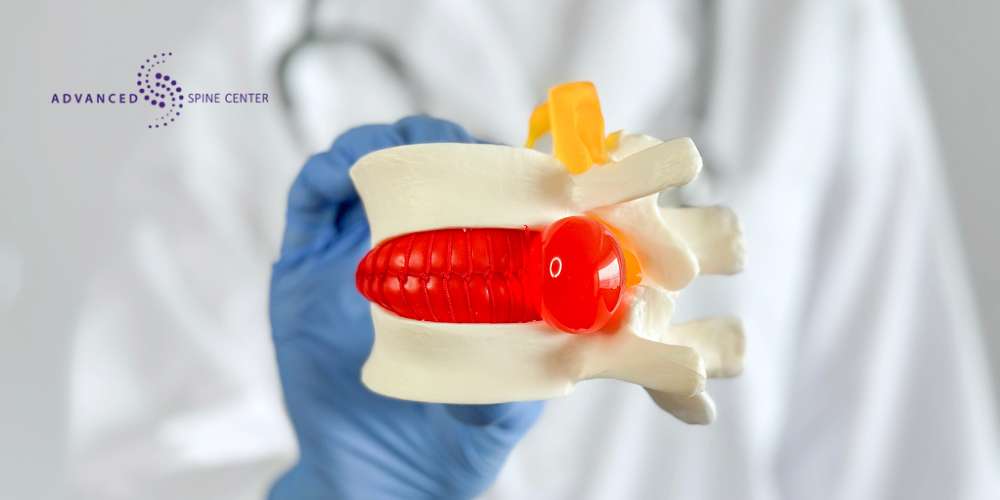
A herniated disc can result from several factors. Aging contributes as the spinal discs lose hydration and strength over time while the ligaments that support them weaken, increasing the chance of progressive disc herniation. Trauma, such as a fall or direct impact to the back, can also cause a disc to herniate through muscle reflexes. Improper lifting techniques, like using back muscles instead of leg and thigh muscles or twisting during lifting, are common causes, as is excess body weight.
Jobs involving repetitive movements, such as pulling, pushing, lifting, and bending, heighten the risk of developing back problems. Smoking also reduces spinal disc oxygenation and impairs nutrient absorption, accelerating disc degeneration and predisposing individuals to herniation. Genetics play a role, too, with those having a first-degree relative affected by intervertebral disc disease potentially inheriting genetic variants that increase their susceptibility to the condition.
How to Diagnose a Herniated Disc
There are many herniated disc treatment options, and a physician can often diagnose a herniated disc based on a patient’s symptoms and a physical exam. Imaging tests, such as X-rays, CT scans, and MRIs, are usually key to diagnosing the problem. It is important that herniated discs heal to relieve any sharp neck pain or slipped disk, restore your muscle strength, and prevent any other nerve damage.
Not all herniated discs need invasive testing, and they can have nonsurgical treatments. Our neck pain quiz evaluates your condition and determines if you have a bulging disk. You can also have magnetic resonance imaging, which retrieves a spinal image. You can also take a straight leg raise test, which involves putting pressure on your legs to see your position in an attempt to stop continuous pain.
What Are the Treatment Options for Herniated Discs?
There are various treatment options for herniated or slipped discs. These include pain medication such as nonsteroidal anti-inflammatory drugs and muscle relaxants, physical therapy, injections, and in severe cases, surgery.
Contact the Advanced Spine Center in Plano, TX, for Herniated Disc Treatment
At the Advanced Spine Center, Stephen Courtney, MD, provides quality medical care, such as spinal fusion, cervical or lumbar injections, or nonsurgical herniated disc treatments. Let us treat your pain today and get you right back on track. Call us today at 972-499-5457.






